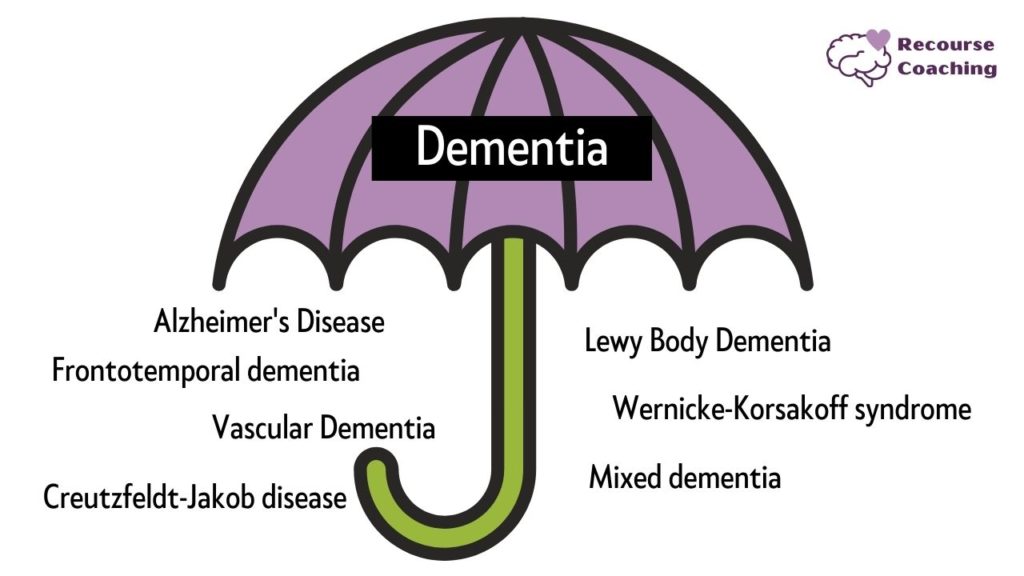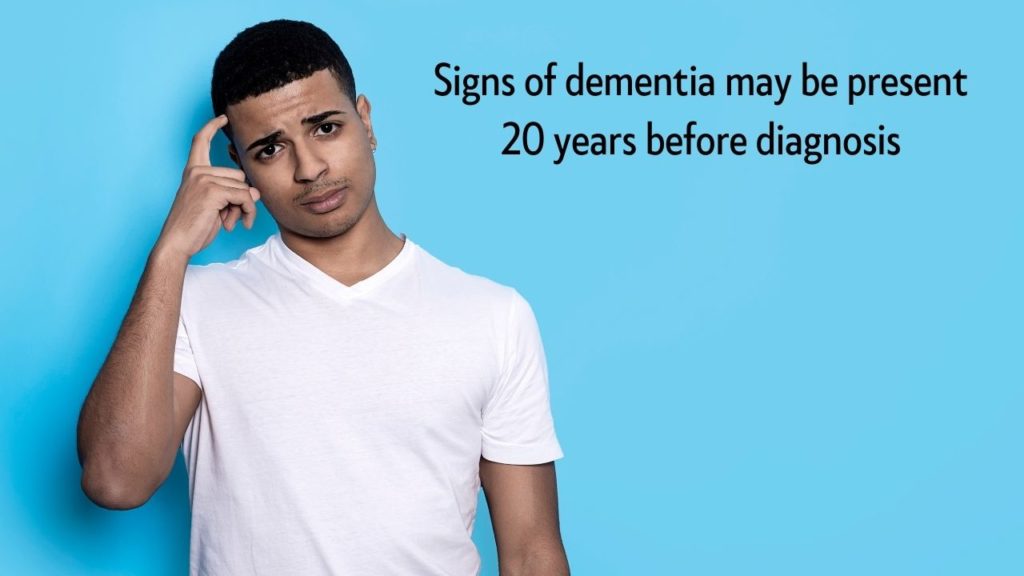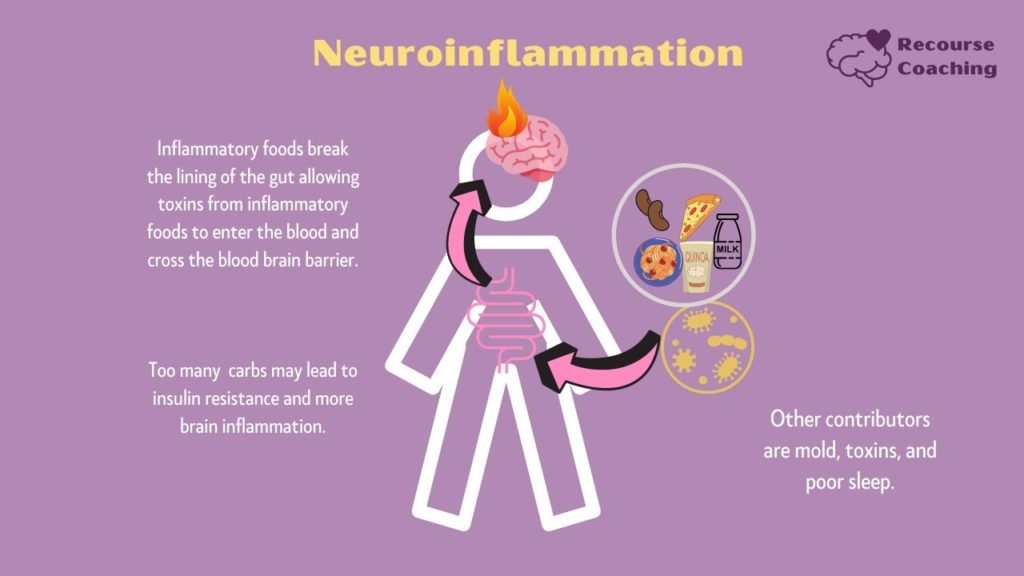Wondering if the forgetfulness and confusion you are seeing in a loved one or yourself could be early signs of dementia? Let’s take a look at what some of the early signs are, and four tips for living a brain healthy life.
Brain Healthy Points:
- The earliest signs of dementia are changes in walking gait, increased irritability, and difficulty completing everyday tasks such as paying bills, cooking, or tasks at work.
- Signs of dementia actually may occur 20 years before a dementia diagnosis.
- While the exact cause of dementia is still unknown, there are many lifestyle changes you can make that have been shown to improve your brain health and that may prevent or delay the onset of dementia.
Understanding Dementia
Dementia is an umbrella term, meaning it is a term that includes anything that causes a decline in memory and cognition and decreases quality of life (x, x.) Cognition includes not only memory, but also thinking and emotion.
Dementia has been framed as memory loss, but really it affects not only memory but the ability to complete tasks, the ability to reason, logic, physical movement of the body, ability to retain learned information, problem-solving, abstract thinking such as empathy, and the ability to regulate emotions.

There are many forms of dementia. Below are seven of the most common types of dementia, from most to least common.
- Alzheimer’s Disease: Neurons in the brain degenerate due to accumulation of two proteins in the brain- beta-amyloid and tau. Alzheimer’s causes about 70-80% of all dementia cases (x.)
- Lewy Body Dementia (LBD): LBD is caused by proteins called Lewy bodies, that accumulate in the brain and impair thinking and movement as well as cause memory problems. It is also known as “dementia with Parkinson’s” because people with LBD often have the same tremors and gait changes found in Parkinson’s disease. LBD accounts for 20-30% of all dementia cases (x.)
- Vascular dementia: Decreased blood flow to the brain, most commonly from diabetes, high cholesterol, diabetes, smoking, and high blood pressure, causes neuronal degeneration. It is the cause of about 15% of dementia cases (x.)
- Frontotemporal dementia (FTD): When neurons in the frontal and temporal lobes of the brain are impaired or destroyed. It presents most often with trouble speaking at first, and swallowing later. After early onset Alzehiemer’s it is the second most common form of dementia in people under 65 years old (x.)
- Creutzfeldt-Jakob disease: This is a form of fatal and rapidly progressing dementia (death usually occurs within one year of onset) caused by the prion protein that is actually an infectious disease. It can be transmitted by direct contact with infected tissue, or by inheriting a mutation in the prion gene. This is very rare, only affecting one in 1 million people (x.)
- Wernicke-Korsakoff syndrome: Most often due to excessive alcohol intake, this form of dementia only occurs in 1-2% of cases (x.)
- Mixed dementia: This is kind of a bucket diagnosis that covers more complex cases where people have two or more types of dementia at once (x.)
Signs of Dementia in Your 40’s?
We now understand that being forgetful, trouble finding words you want to say, and having “senior moments” are not “a normal part of aging.” Studies are showing that signs of possible dementia may appear 20 years before diagnosis (x.)

Some of these very early signs that people may experience in their 40’s and 50’s are:
- Consistently losing items
- Often forgetting words
- Loss of smell (x)
- Changes in gait (tripping, leaning to one side while walking) (x)
- Consistently getting lost driving or forgetting where you were going
- Struggling to learn new things at work or solidifying learning from reading and courses
In order for these symptoms to be of concern, they must be a change from normal functioning. We all have different brains, so if you have always been a bit of a forgetful person and misplace your keys, then this would probably not be a sign of cognitive decline for you.
While it may sound scary, that symptoms of dementia can show up so early, it doesn’t have to be. Think of them as early warning signs that can help you. The research is heartening because it shows that the earlier you catch signs of cognitive decline, the earlier you can start to do something about it and start living a brain healthy lifestyle.
We will discuss a few ways to start supporting brain health a bit later, but let’s look at some of the early signs of dementia that happen closer to diagnosis that you are probably more familiar with.
Seven Early Signs of Dementia
Now let’s look at the most common symptoms we see closer to actual diagnosis in early stages of dementia or mild cognitive impairment. In general, these are changes in daily functioning.
Remember, again, these need to be a change from previous functioning in order for them to be considered possible dementia. If any of the below are significant changes from your normal, or that of your loved one, document changes and talk to a doctor.
Trouble Sequencing
This is by far one of the earliest signs of dementia. Sequencing is our ability to think of and follow the steps needed to complete a task (x, x.) These tasks range from everyday things to periodic tasks.
Some examples are paying bills, tying shoes, cooking, driving, or remembering what you wanted to get from another room. Other examples are ordering an Uber for a ride, planning vacations, or completing work projects.
Trouble with sequencing can be hard for family members to notice at first because the brain will compensate for struggling with daily life tasks and find ways to kind of cover mistakes so other people do not notice them.
Instead, the behavior you might see is anger or frustration at times you would not have seen it before, such as agitation over paying bills or quick and seemingly out of the blue anger when at a restaurant ordering food. You may also notice less attention to cleanliness and safety, possibly because the sequencing of these tasks are too difficult now.
Apathy
Apathy is when you do not want to do things, even things you once enjoyed. This is different from depression in that it is not also sadness, it is just, apathetic, like you have lost motivation and just don’t care to do things or be involved in what is going on around you (x.)
Impaired Word Finding
You know that phrase “the word is on the tip of my tongue?” This is when your brain knows the word you want to say and can imagine the thing you are thinking of, but you just can’t say the word. Sometimes this happens just because we are thinking too fast or there is too much external stimulus. If it happens often, it can be a sign of cognitive decline (x) where the correct neurons are not firing and so you often can’t say the right words you want to say.
Mood and Personality Changes
The early mood changes most often seen in dementia are rapid mood swings, such as being angry or irritated, having a “short fuse.” You may notice overwhelm, which is a shutdown where people just leave a conversation or event or sit in a corner. You may also see anger or shut down with daily tasks such as cooking, balancing a checkbook, sending emails, or cleaning (x.)
Poor Decision-Making
Making impulsive decisions someone would not have made before is an early sign of dementia. You may also see someone needing more time to make decisions or making unsafe decisions.
Some examples of poor judgment or impulsivity are spending a large amount of money, making drastic changes to their estate, trouble driving, or struggling to order food from a menu. You may see a person start to make repetitive decisions, such as ordering the same food items at restaurants because making a decision between multiples items is too difficult.
Disorientation and Confusion
These two things look similar and present as not remembering why a person walked into a room and then wandering between rooms, or being unable to figure out how to drive to the grocery store. Social activities may cause anger, anxiety, or shutdown due to busy, loud, or chaotic environments that lead to disorientation. You may also hear the same story periodically over the week or some repetitive questions.
Impaired Spatial Awareness
Our ability to figure out the distance between two objects is called spatial. People with poor spatial awareness may miss the table when putting a cup down, drive over curbs, or have trouble zipping clothing (x.)
If you see these signs in yourself or a loved one, keep a diary of them and take that information to a doctor for a proper neurological workup. There are causes of dementia that are reversible, such as some side effects from medications, an infection, or some forms of water around the brain.
If you see a quick change in ability to function daily, see a health professional right away to rule out possible traumatic brain injury, stroke, or other acute injury or issue with the brain.
It is helpful to know the possible early signs of dementia, but a proper workup is necessary to really know what is going on. If it is dementia, early diagnosis can help you or your loved one get the help they need early and have a better quality of life.
Four Keys to Brain Healthy Living
How we live on a daily basis affects how our brain functions and the earlier we start these practices, the longer our memory and cognition will remain intact (x.)
Here are the top four things you can start working on now to improve your brain health (x):
- Managing insulin resistance
- Lowering gut and brain inflammation (x)
- Proper sleep
- Exercise
Let’s look at each of these a bit closer and how they improve cognition and functioning.
A quick note: one of the worst things for brain health is overwhelming the brain with a lot of changes all at once. When reading about the lifestyle changes below, think about which one area you struggle the most with and work on that first for a month. Then you can add in more changes the next month.

Managing Insulin Resistance
Alzheimer’s is often called “Type 3 Diabeties” because of it’s link to insulin resistance (x.) Insulin resistance is when our cells become resistant to taking insulin and can’t use glucose correctly (x.) It occurs most often because of high carbohydrate intake, not only from sugary and processed foods, but it can also happen in “healthy” diets should people eat an abundance of grains or starchy vegetables such as sweet potato and squash.
Insulin resistance can lead to brain fog, confusion, irritability, as well as brain inflammation and as time passes, possible dementia.
A diet that is generally low in sugary and processed foods and higher in healthy fats, green veggies, and protein can help improve insulin resistance by regulating blood sugar. In fact, a systematic review of the effect of ketogenic diets with very limited carbohydrate intake on patients with Alzheimer’s disease or mild cognitive impairment found keto diets generally improved cognition and memory (x, x.)
For most people, a Paleo diet that removes these foods as well as inflammatory grains and dairy (which is helpful for lowering gut and brain inflammation mentioned below) that stays around 150 grams of carbohydrates or less a day is a great place to start for supporting brain health.

Lowering Gut and Brain Inflammation
The gut and brain are connected through the gut/brain axis (x.) If the gut becomes inflamed, it can allow inflammatory toxins to cross the gut/brain axis and lead to inflammation in the brain as well (neuroinflammation.)
Further, if the gut microbiome (the delicate balance of bacteria and fungi in our gut) is out of balance, this can also cause symptoms such as brain fog and irritability, as well as contribute to brain inflammation (x.)
Eating an anti-inflammatory diet, such as a Paleo diet as mentioned above, helps balance the gut microbiome and reduce gut and brain inflammation, which can improve cognition, regulate moods, and improve memory and learning (x.)
Sleep
Adults need 7-8 hours of sleep daily for proper functioning of the brain and body. In relation to dementia, consider this (x, x.):
- Sleep is when the amyloid plaques associated with Alzheimer’s (which are produced due to brain inflammation) are cleared from the brain.
- Sleep is when memories are stored and learning is solidified.
- Just one night of an hour of lost sleep leads to more confusion, brain fog, and disorientation throughout the day.
If you are not sleeping enough there are a few things you can try right away.
Wearing an eye mask to cut excess light so your brain does not see light through your eyelids and think you need to wake up helps many people stay asleep. Wearing blue light blocking glasses 1-2 hours before bed helps many people fall asleep. You can get your body into rest mode by stopping eating at least two hours before bed (digestion is a lot of work on the body and decreases sleep.) Setting consistent daily sleep and wake times help support good sleep.
Exercise
Exercise is great for the brain in decreasing dementia risk, as well as improving cognition and memory in people with dementia (x.)
Exercise also increases bloodflow to the brain, which is important to reduce the risk of vascular dementia. Exercise increases BDNF (brain-derived neurotrophic factor) which supports neuroplasticity which improves memory and cognition (x.)
In general, exercise has been found to improve cognition, even in people with dementia and exercise improves sleep as well (x.)
While many people say only walking 30 minutes three times a week is enough exercise, you do want to be sure you are doing something to get your heart rate up a bit. For most people that means at least over 100 bpm (beats per minute.)
If you already exercise, make sure you are getting a mix of moderate heart rate endurance (30 minutes or more,) high intensity training, and strength training.
If you are new to exercise, then start with walking, cycling, or an arm bike to get the heart rate up. Start with 5-10 minutes a day.

Daily Living for Better Cognition
I hope this article helps you know a bit more about your brain and what things to monitor to track how your brain is functioning. Remember that any sudden changes in ability to function daily, changes in ability to move, or changes in mood should be checked out by a doctor as soon as possible.
If you are seeing any of the early symptoms listed and want to improve your brain health, start slowly so you do not increase your stress levels. Increased stress increases brain for and confusion.
Most often people start with choosing one of these three options for the first month, depending on which lifestyle change they need the most:
- Starting to walk for 10 minutes a day
- Adding in more veggies while decreasing sugary and processed foods
- Trying to go to bed and wake up at consistent times every day
If you feel you or your loved one may have dementia based on the early signs, please see a qualified neurologist for a neurological workup and cognitive testing.
If you are really struggling with changes to a brain health living, you can work one on one with me to get a personalized brain health plan and support.
If your loved one already has dementia and you need dementia care coaching, I have been a dementia care specialist for 12 years and would be happy to work with you.



